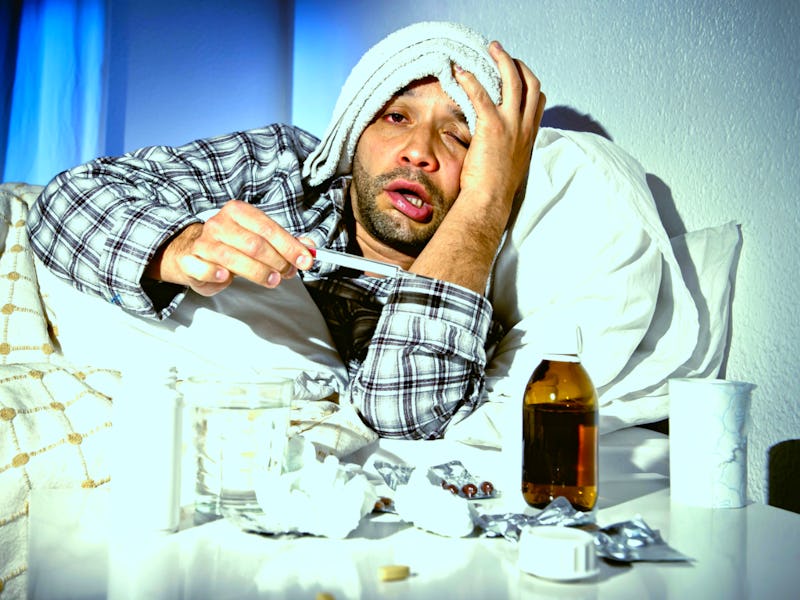Whiny Men Claiming to Have 'Man Flu' May Be Justified, Says Doctor
'Tired of being accused over-reacting, I searched the available evidence.'

The “man flu” is much like the flu — but only men seem to get it. If you observe a patient with man flu you may detect the usual symptoms, such as a fever, chills, and muscle aches, but most notably, you’ll notice extended periods of complaining. Whether it’s fair to blame the woes of the man-flu patient to his poor attitude rather than his poor immune system, however, has been debated by indignant patients for many years. An analysis published Monday in the BMJ, however, suggests that their whining may be justified.
In a review published in BMJ’s Christmas edition — the journal’s yearly compilation of lighthearted but scientifically sound science — Kyle Sue, Ph.D., a clinical assistant professor at the Memorial University of Newfoundland, argues that the concept of man flu is “potentially unjust.”
Many studies suggest that men have weaker immune responses to viral respiratory viruses than women, supporting the idea that men actually are hit much harder when struck by the flu, says Sue. When men insist on the need to rest when they have the flu, they may just be manifesting their evolutionary urge in order to preserve energy — even though some bystanders may comment that male demands may seem a little much.
Guys with the man flu aren't just being dramatic.
Sue’s quest to exonerate whiny, flu-ridden men led him to analyze a group of existing studies showing that females have better immune systems than males because they have different hormones. A 2016 mouse study that he cites, for example, shows that the presence of the steroid hormone oestradiol in female mice is linked to their stronger immune responses to influenza. And in the two human-sample studies he cites, scientists show that exposure to oestradiol and estrogen — hormones that are most prominent in female bodies — decreases influenza symptoms and that cells taken from premenopausal women have a stronger immune response to rhinovirus than those taken from men of the same age.
Other research, he points out, shows that male hormones can prevent men from responding adequately to flu vaccines. Sue refers to a 2013 study in which Stanford University School of Medicine scientists show that men with high testosterone levels benefit less from flu vaccines than women and men with lower testosterone levels. Women, on average, had a stronger antibody response to the vaccine, which the Stanford scientists believe can help explain why males are generally more susceptible to bacterial, viral, fungal, and parasitic infections than females.
“The authors of another study speculate that reduced immunity is less important for men because males of many species are more likely to die from trauma before infection kills them,” writes Sue.
Must be man flu.
But does a weakened immune system mean that the symptoms feel worse for men than for women who also have the flu? While women appear to recover faster than men from the flu, the evidence suggests that the pain they experience while they’re sick is all that different.
“People think that when we get sick it’s the virus that causes our symptoms, but often those symptoms are from the immune response,” Johns Hopkins Bloomberg School of Public Health biologist Sabra Kelin told STAT in March. “Cells clogging our airways, proteins causing inflammation, fever, and chills — that’s all immune response to a flu virus. And it is more common in females than males for those responses to go on too long and to be too intense.”
Sue, concluding that more in-depth study is needed to determine once and for all whether the man flu is real, also admits that he has some skin in the game, writing: “Tired of being accused over-reacting, I searched the available evidence to determine whether men really experience worse symptoms and whether this could have any evolutionary basis.”
He may references a study showing that doctors are more likely to under-diagnose men’s flu symptoms than women’s, but it’s important to consider that, historically, it’s women — especially women of color — that are underdiagnosed and taken less seriously by doctors in general, regardless of the illness. That doesn’t make the pain men feel during the flu any less real — but may explain why the women listening to their complaints are tepidly sympathetic at best.